#strategic plan for diversity equity and inclusion
Explore tagged Tumblr posts
Text
Transform your business with our diversity consultancy and marketing services. We help you leverage the power of diversity to build strong, inclusive brands that resonate with a wider audience. Let us drive your growth and success.
#career development plan for employees#equity training consultants#career development training programs#consultants & training providers#diversity equity and inclusion strategic plan#equity consulting services#leadership development training#corporate diversity training#diversity equity and inclusion strategy#diversity and inclusion consulting#leadership training and development#leadership development program#diversity and inclusion consulting firms#safer work environment#equity and inclusion training
0 notes
Text
Georgians are in the streets fighting for their democracy. The Georgian Dream party, which is working to align Tbilisi with Moscow’s interests, declared victory in the country’s Oct. 26 election before the votes were even counted. Voters and election observers were harassed by Russian-funded gangs and mobsters; just after the election, protesters holding European Union flags were sprayed with water from high-powered hoses. And the person who has the iron will necessary to lead the charge against Russian-inspired authoritarianism in Georgia? A woman: President Salome Zourabichvili.
This is no accident. Across the world, women have, and are, playing incredible roles as bulwarks against the rise of authoritarianism. Moldovan President Maia Sandu is standing up to a tsunami of Russian disinformation. In Poland, women played a critical role in the effort to oust the right-wing populist Law and Justice (PiS) party. In Hong Kong, women continue to be the practical and normative face of resistance to Chinese authoritarian rule.
These are the freedom fighters of the 21st century. And yet, the U.S. national security community tends to view women’s issues as a domestic concern, frivolous, or irrelevant to “hard” security matters. For example, in 2003, discussions of securing Iraq excluded women, with a top U.S. general stating, “When we get the place secure, then we’ll be able to talk about women’s issues.” More recently, the role of women in the military has been reduced to discussions of diversity, equity, and inclusion, rather than a focus on how women have been vital to solving the United States’ most wicked national security problems—from serving on the front lines in combat to providing essential intelligence analysis. But if the overall aim of U.S. national strategy is to shore up democracy and democratic freedoms, the treatment of women and girls cannot be ignored.
Globally, women’s rights are often eroding in both policy and practice, from the struggles of the Iranian and Afghan women who exist under gender apartheid to the Kenyan women experiencing the harsh backlash of the rise of the manosphere. In tandem, there’s been a sharp rise in reports of online harassment and misogyny worldwide.
National security analysts explore issues and psychologies through any number of prisms, but Women, Peace, and Security (WPS) remains an underutilized one. One of the national security community’s core tasks is discerning signals from noise in the global strategic environment, and regressive ideas on gender and gender equality can be a useful proxy metric for democratic backsliding and authoritarian rise.
The United States’ 2023 Strategy and National Action Plan on Women, Peace and Security provides the backbone for the United States to leverage WPS to counter authoritarianism. It highlights that displays of misogyny online are linked to violent action. The plan also points out that formally incorporating gendered perspectives is essential for maintaining democratic institutions at home and modeling them aboard. This includes recognizing misogyny—online or in policy—as an early indicator of authoritarian rise.
Unfortunately, WPS is often misread as simply including more women in the national security workforce. But it is more than that. It offers a framework for understanding why it is useful to take gendered perspectives into account when assessing how the actions of individuals or groups enhance national security, which is especially important at a time when authoritarian regimes are weaponizing gender in ways that strengthen their grip on power domestically and justify their aggression abroad.
In Russia, President Vladimir Putin has argued that he is the guardian of traditional Christian values, telling women that they should be back at home raising children, and has been rolling back domestic violence laws at the same time. Days before invading Ukraine in February 2022, Putin said, “Like it or don’t like it, it’s your duty, my beauty,” which was widely interpreted within Russia as a reference to martial rape. Russia’s own army is built on a foundation of hierarchical hazing in which “inferior” men are degraded by their comrades. With that kind of rhetoric from the top, is it any wonder that Russian soldiers’ war crimes have included the rapes of women and children?
But Putin isn’t alone. In Hungary, Prime Minister Viktor Orban has consolidated media outlets to censor women’s voices, in the name of protecting traditional values. He has also used coercive financial practices to push women out of the workforce and positions of political power and into more traditional roles of wife and mother. In Belarus, President Alexander Lukashenko attempted to force the deportation of the most prominent woman opposition leader and imprisoned her after she tore up her passport to prevent it. In China, where women were once told they “hold up half the sky,” President Xi Jinping has worked to undo decades of Chinese Communist Party policy on gender equality. Chinese women are now being encouraged to return home and become mothers, while feminists have been targeted legally and socially.
The WPS agenda provides the U.S. national security community with three opportunities to recognize, understand, and counter early-stage authoritarianism.
First, the United States can do a much better job of supporting women’s groups around the world as a central aspect of its national security strategy. Women’s groups are often a bellwether for authoritarian rise and democratic backsliding—as currently on display in Russia, China, Hungary, Georgia, and Belarus, where women inside and outside their respective regimes have been specifically targeted or attacked.
Women have also found innovative ways to resist the rise of authoritarian norms. In places like Moldova, women have acted as bulwarks against authoritarianism despite vicious disinformation campaigns targeting women leaders. Yet when it comes to formulating and executing strategies on national security, women’s groups are often left in the margins and their concerns dismissed.
Second, gender perspectives are essential to more fulsome intelligence gathering and analysis. The U.S. intelligence community can do a much better job of integrating gender—particularly as it relates to the treatment of the most vulnerable—as an indicator of societal and democratic health. This includes understanding how both masculinities and femininities influence decision-making and how, in turn, lived experiences act as necessary analytical tools. Training collectors and analysts of intelligence to recognize gendered indicators will provide a more robust view of the geopolitical landscape and fill critical holes in national security decision-making.
Finally, the United States must improve the participation of its national security community in WPS and feminist foreign-policy discussions. For too long, the “hard” security sector has distanced itself from more “human” security-focused endeavors and treated women’s rights as something that’s just nice to have.
Yet national security is an essentially human endeavor, and gender is a central component of what it means to be human. This is something that needs to be appreciated to better understand the many dimensions of the conflict—disinformation, online influence campaigns, and lawfare—that authoritarian regimes are waging against the United States and its allies.
55 notes
·
View notes
Text
2023 Board Candidates
We have taken time to go over the bios and platforms presented by the current candidates, and will here present our thoughts for each on how we feel they align with our campaign's goals at this stage. We are particularly concerned with how willing and capable we feel they would be in helping the OTW meet its commitment towards developing anti-racist policies and practices.
We encourage everyone to read the platforms for themselves, and we look forward to getting to know each candidate more during the question-and-answer period.
Anh P.
Gave no pronouns, the bio uses they/them.
Anh P. identifies the OTW's lack of transparency as a direct symptom of its current structure and human resource management not being up to the task of managing its 900+ volunteers, but does not offer solutions in their platform at this time. Their main focus seems to be reaching out towards new fans, particularly in non-English-language fandoms, for which their international, non-Anglo background and perspective are well-suited. However, they do not specifically acknowledge racism as a distinct problem nor do they indicate that they would prioritize anti-racist goals. They do not mention the Terms of Service (TOS), Policy and Abuse Committee (PAC), or their position on a Diversity, Equity and Inclusion (DEI) consultant, nor do they state a position on using funds towards hiring anyone for that position.
Audrey R.
Gave no pronouns, the bio uses she/her.
Audrey R. has experience within the organization and has a background in policy and nonprofit work, which could translate well to the Board. The work she has done has been on the Strategic Planning committee, which has worked at a particularly slow pace (6 years for implementation of the strategic plan), which she acknowledges “does little to address immediate needs.” Her stated primary reason for running is to protect fandom from AI which, while admirable and important, is not our focus – and to that end, she does not mention racism or harassment at all. She expresses willingness to have paid employees and calls for a conflict resolution management system for volunteers.
Jennifer H.
Pronouns: she/they.
Jennifer H. specifically addresses the importance of communication with the OTW’s user base. She also speaks to the need for complete structural reform. Her platform indicates an experienced perspective on what she can accomplish as a Board member and a willingness to do the hard work to make things better. We find their platform promising in that they are directly addressing issues we have raised, show these issues to be a priority, and express an understanding of the difficulty of the road ahead, but a willingness to do the hard work anyway. She seems to have a bit less experience working for the org, having only joined in 2022, but that is not necessarily a point against them.
Kathryn S.
Gave no pronouns, the bio uses she/her.
Kathryn S. has experience in non-profit work and community activism, implementing DEI efforts and Human Resources (HR) experience which seem to make her a good fit for the Board and realizing our goals. She explicitly prioritizes the hiring of a DEI consultant along with an HR position. She does mention “recent controversies” in her platform, though she does not specify which ones. Her experience with the OTW is significant, at 9 years.
Qiao C.
Pronouns: she/her.
Qiao C also brings an international fandom perspective and focuses primarily on the importance of communication inside and outside the organization. She makes a very brief mention of updating the TOS. She does indicate she would like to hire an HR professional, but her platform – while it mentions the recent protests and spends time discussing diversity issues – makes no explicit mention of racial issues outside bringing in more diverse volunteers. We do feel that more diverse voices within the OTW are important, though diversity alone is not going to solve the issue of racist harassment currently allowed in the OTW’s policies and enforcement practices. There is nothing else in her platform that speaks to dealing with racist harassment, updates to the TOS, or hiring a DEI consultant.
Zixin Z.
Gave no pronouns but the bio uses she/her.
Zixin Z would also bring an international presence to the board. She mentions the need for structural change, paid positions, and increased documentation to prevent the loss of institutional knowledge. She also mentions the need for outreach towards non-English-speaking fans and has a desire to provide support to volunteers from minority groups. She does not mention racism, racist harassment, or hiring a DEI consultant in her platform, so outside the outreach and support she mentions, there is not enough for us to conclude that these would be priorities for her.
[Edited July 10,2023. Revised Zixin Z.'s position on outreach to be "towards non-English speaking fans and has a desire to provide support to volunteers from minority groups" and add "outside the outreach and support she mentions" to the subsequent sentence. Original stated the outreach would be towards "Chinese-speaking fans". ]
[Post updated with explanation of the scope of these summaries. Please reblog the completed version if doing so]
#vote to end otw racism#endotwracism#ao3#archive of our own#otw#organization for transformative works#fandom#antiracism
267 notes
·
View notes
Text
My state has good news for women for a change!
A Connecticut Democrat successfully changed the wording of new legislation to add the phrase 'expectant mothers', after branding the original suggested language - 'pregnant persons' - an affront to women.
State Rep. Robyn Porter, a Democrat representing New Haven, proposed an amendment to House Bill 5454 to incorporate the term 'expectant mothers' during discussions on a bill regarding state funding on Thursday.
'My children call me mother, ma, mommy. It depends on the day,' Porter said Thursday. 'I don't answer to pregnant person or birthing person. That's not what I answer to.
A huge part of my identity is wrapped around being a mother and a grandmother. So I find it an affront that someone would try to tell me that what they're putting on paper for the purpose of policy covers me when I'm telling you that it doesn't,' she continued.

The bill was originally launched by the Human Services Committee before reaching appropriations to incorporate the phrase 'expectant mothers' to lines five and six.
The original lines of the bill read '… shall create a strategic plan to maximize federal and state resources for mental health services for children six years old and younger, their caregivers and pregnant persons.'
Lawmakers voted 32-16 to adopt the term 'mothers' following a 35-minute debate.
The unexpected decision was achieved through a coalition of Republicans and members of the legislature's black and Puerto Rican Caucus - with all 16 opposing votes coming from Democrats.
Porter stated, 'We want to talk about discrimination? Well, I'm here to tell you that black people in America know that very well.
'This is where I really get frustrated in this building because what we say is dismissed, disregarded, disrespected. … I'm always asked to compromise when I come to the table, and I'm expected to do so.
She added, 'We were mothers first. Yes, times are changing, and I'm fine with that because that's life... But you don't get to grow, and you don't get to talk about diversity, equity, and inclusion and exclude me and the other women like me who identify as mothers. You don't get to do that.'
She said some women 'want to be called mothers. What's wrong with that?'
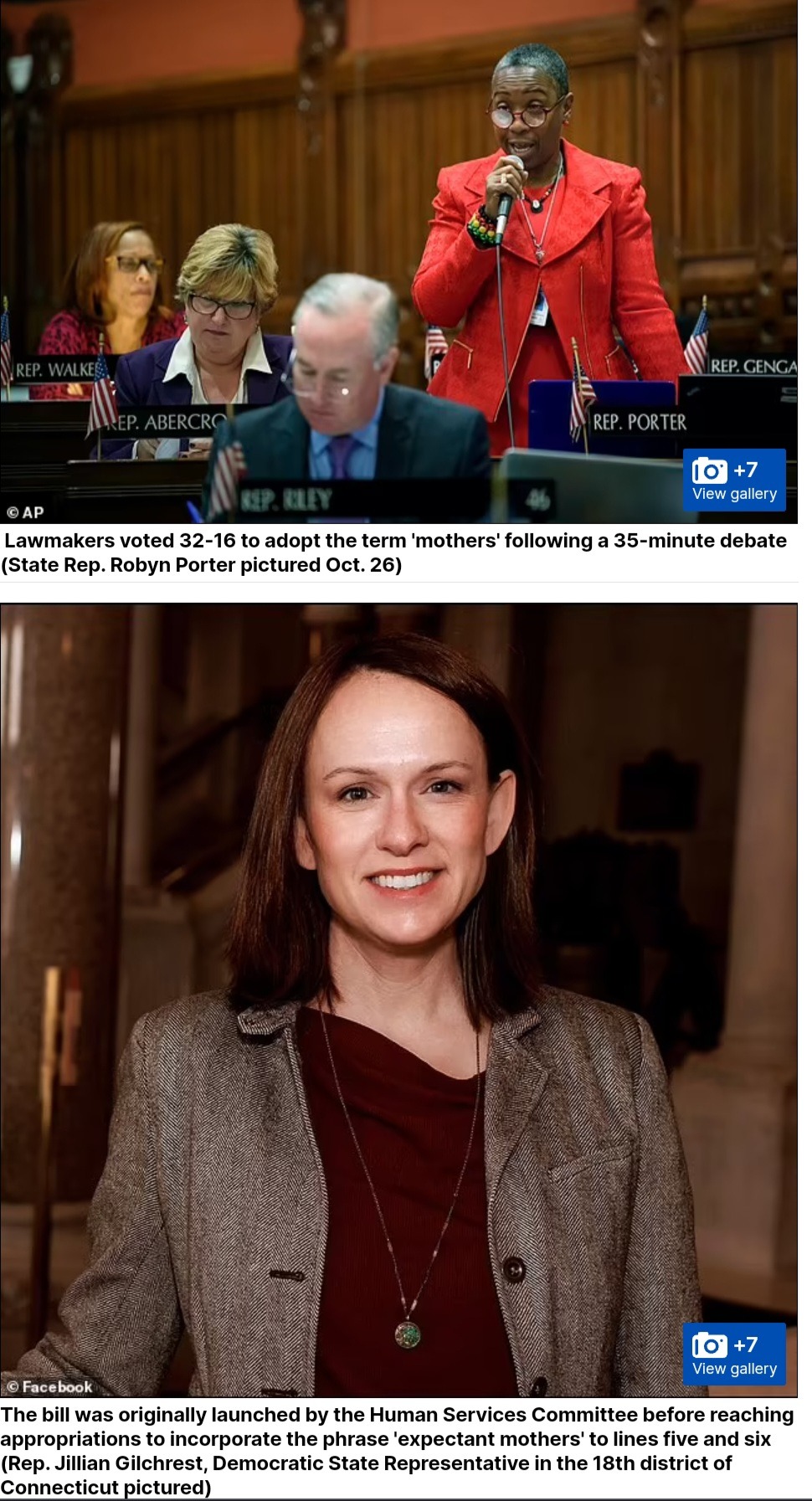
The primary advocate for the original language of 'pregnant persons' in the bill was Rep. Jillian Gilchrest, a Democrat from West Hartford.
'Pregnant person is actually the inclusive term,' Gilchrest said. 'It is a gender neutral term, and it would encompass expectant mothers, pregnant women.
'As we talk about DEI, this is the direction we are hoping to move in in this state and ideally across the country.
'And so the term pregnant persons is the more inclusive term, and so I would ask my colleagues to oppose the amendment.'
Many legislators representing the state's major urban cities rallied in support of Porter's amendment.
State Rep. Geraldo Reyes, a Democrat from Waterbury and a prominent figure in the black and Puerto Rican Caucus, emphasized the cultural significance of motherhood.
'Culturally, as a Puerto Rican person, there is nothing more sacred than a mother... There is only one mother … Just as I opposed the word Latinx, I oppose the word expecting person,' he said.
Similarly, Rep. Minnie Gonzalez, a Democrat from Hartford backed Porter's amendment and emphasized his support for the LGBT community.
'It's nothing against the LGBT community. It's nothing about them,' he said. 'Nothing against them. We support them … We recognize that they have rights, but where are my rights? I have the right to defend my rights.'
Rep. Anthony Nolan, a New London Democrat was emphasized then importance of the word 'mother' in black communities.
'I'm just astonished by some of the things that are being said,' he said. 'In black culture, who really are ingrained with that word mother, for us to go home and call our mother something other than a mother, we would end up with a slap across the face.
'We're not removing anything. We're just asking to add something that is dear to those that are speaking in regards to it, especially in the black culture.'

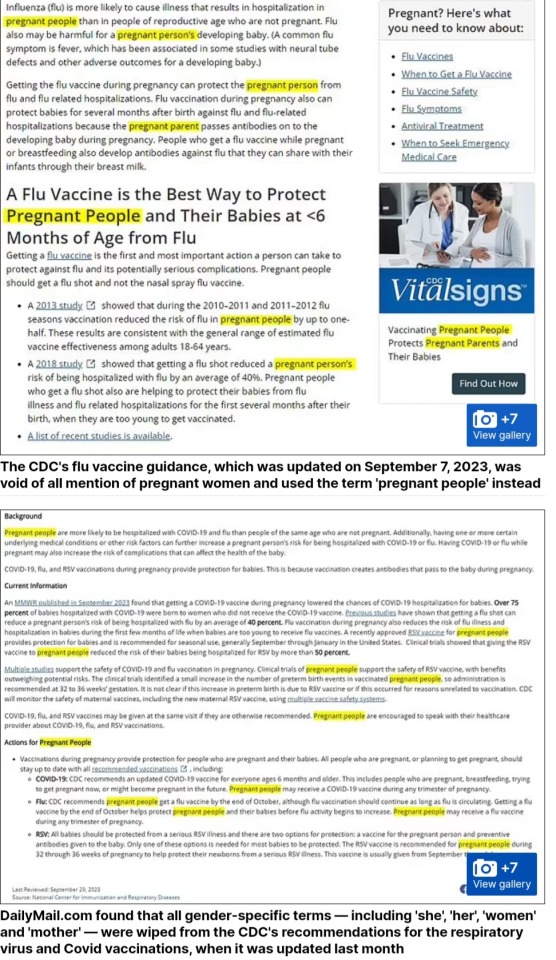
Last year, the CDC was slammed for 'appalling' new health guidance in which it replaced the word 'women' with the gender-neutral term 'pregnant people.'
The erasure of the term women can be seen in recommendations for a host of respiratory virus vaccinations for pregnant women.
This includes material promoting shots for Covid, flu and RSV - a common respiratory condition that most affects older adults and young children.
Although usually mild, all three viruses can be deadly in pregnant women.
All gender-specific terms — including 'she,' 'her,' 'women' and 'mother' — were replaced with gender-neutral terms like 'pregnant people' and 'pregnant person.'
A doctors' organization said the CDC was 'cowering to political forces' at the expense of sound medical advice at the time.
#usa#connecticut#Expectant mothers#State Rep. Robyn Porter#new haven#House Bill 5454#Seeing a Democrat willing to say mother instead of gender neutral terms is like seeing a Unicorn
43 notes
·
View notes
Text
Via American Greatness,
The Federal Emergency Management Agency (FEMA) is supposed to be the government’s premier emergency relief organization in times of disaster, like the situation now faced by victims of Hurricane Helene’s aftermath in North Carolina and Tennessee.
But according to the FEMA website, the agency now places higher priority on instituting Diversity, Equity and Inclusivity guidelines than on easing the suffering of Americans displaced by disaster.
Among the goals listed in FEMA’s strategic plan are to:
Instill equity as a foundation for emergency management
Lead whole of community in climate resilience
Promote and sustain a ready FEMA & prepared nation
What does that look like in action?
Here’s an example of a FEMA disaster preparedness meeting where participants discuss how LGBTQIA individuals were suffering disproportionally before the storm compared to other disaster victims.
Notice how the focus shifts from doing the greatest amount of good for the greatest amount of people to ensuring that they are promoting “equity in disaster relief.”
9 notes
·
View notes
Text
FEMA: Under Administrator Deanne Criswell's leadership, FEMA has shifted its priorities, placing a heightened focus on Diversity, Equity, and Inclusion (DEI). The agency's 2022-2026 Strategic Plan cites President Biden's Executive Order 13985 on advancing racial equity as a guiding framework. Using this directive, Criswell has emphasized "equity of outcome" both in FEMA’s hiring practices and in its disaster response protocols. Critics argue that this has translated into preferential treatment for certain racial and ethnic groups when it comes to employment and the distribution of aid.
Moreover, this DEI focus has expanded FEMA’s involvement in providing resources to NGOs, particularly through hundreds of millions in direct grants aimed at supporting migrants who have entered the U.S. both legally and illegally. This shift in focus has also drawn attention to Criswell's emphasis on climate change initiatives, which some view as unrelated to FEMA’s core mission of emergency management.
The diversion of FEMA's resources toward these priorities, critics claim, has left the agency ill-prepared to handle natural disasters like Hurricane Helene, resulting in an inadequate response in the affected states. As FEMA spreads its efforts thin on unrelated initiatives, it lea

7 notes
·
View notes
Text
Notes from the Nov 12 OTW Public Board Meeting
Today's Agenda:
Decisions made since the last public board meeting
Welcome new Board members
Announce officer roles
Diversity update
Any other business
Decisions taken since last meeting:
Approved Finance requests
Approved new chairs for Fanlore, Support, and Strategic Planning
Granted preliminary approval for complaint management system
Created Twitter report for impersonation account
Approved new committee formation - Board Assistants Team
Approved new chairs for Board Assistants Team
Signed onto a letter opposing the Stop CSAM Act introduced in the US Senate
This meeting ran much more smoothly than the last due to the new rules and the way questions were handled. The first roll call showed 91 guests, and the last showed 88. Anh, as president, ran the meeting and got through the cut and paste business quickly, leaving 40 minutes for questions.
The diversity, equity, and inclusion (DEI) update was very brief but contained long awaited news:
We're delighted to announce that we've signed a contract with a consulting firm, who will be working with us on an organizational culture audit. (If you were wondering about the unlabeled $96,000 line item in the budget, this was it!) The consulting firm has already completed an initial survey and begun interviewing volunteers, and will continue this process over the next few weeks. DEI subject matter experts will be involved and consulted throughout the process. We are incredibly excited to work with them and make the OTW a better, more inclusive place!
Later, in response to my question asking for more details, Zixin said they would not be sharing information about the firm in order to protect them from possible harassment and that they don't have a sense of how many people at the firm will be working on this or for how long. They expect a preliminary report by the end of January 2024 and will give updates at the next public meeting.
Considering how long we've been waiting for progress on the DEI consultant, getting a report from them by January feels lightning fast, but history suggests the next Board meeting won't be until March, so it'll probably be a while before that information reaches us.
Also of note was the question of paid staff: Has the board been looking into hiring a volunteer to look into hiring paid staff? Is there a timeline for hiring paid staff?
Kathryn S responded:
We do have a timeline for Paid Staff Transition in our Strategic Planning 2023-2026: The Volunteers & Recruiting Committee has been working on finding an external HR firm for the organization for several months. There are two main goals behind for the OTW behind this initiative: • To help the OTW create a better environment for its volunteers by reviewing our current org-wide policies and procedures and creating new ones when needed; • To help the OTW transition from a fully volunteer-based organization to hiring our first employee. The committee has interviewed several firms, but the size and global scope of the OTW's volunteer and user bases make it a complicated project. They are still meeting with candidate firms and exploring potential alternatives.
I asked a follow up to this, a request for an update on the search for a Paid Staff Transition Officer, but it did not make it before the Board during the relevant conversation, or in the meeting at all. I used the double arm (o//) to indicate it was a follow up question, but it still depended on votes to get in front of them, which feels like a flaw in the system, but I'll get an answer eventually, see below.
People asked a lot of good questions, and we got answers for the promised ten, even though it made the meeting run about twenty minutes longer than its scheduled hour. Some of the topics covered: confidentiality policy for Board and the emergency procedures promised to volunteers; Finance investing OTW's money to avoid being solely dependent on donors; evaluation and improvement of the Constructive Corrective Action Procedure (CCAP procedure); progress on the ToS review; proposed subcommittee to handle complaints and conflicts within the OTW; complaint management system for volunteers.
If you'd like to learn more, I recommend joining the OTW Discord and reading back through the #public-board-meetings channel, which is pretty straightforward now that Board members are the only ones allowed to post there. If you've already joined, you can use this link to jump to the top of the Nov 12 meeting.
The meeting closed with the news that the Board is planning to release a high-level overview of their timeline that includes their goals for the 2023-2024 Board Year at the next public meeting.
The questions that didn't get answered during this meeting will be answered in the #questions-answers channel starting in two weeks. So expect those around November 26, when the Board will begin posting weekly Q&A threads.
#otw board meeting#organization for transformative works#otw#archive of our own#ao3#end otw racism#what are they building in there#fandom
35 notes
·
View notes
Text
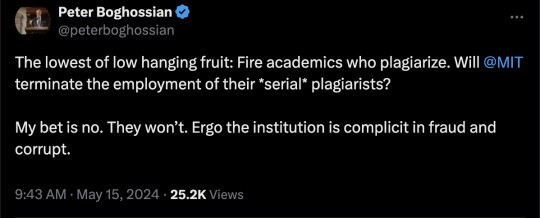
By: Aaron Sibarium
Published: May 14, 2024
In dissertation titled 'Cite a Sista,' Tracie Jones-Barrett stole an entire passage on 'ethical considerations' from her classmate
In June 2021, a year into the cultural aftershocks of George Floyd's death, the Massachusetts Institute of Technology set out to meet the moment, as so many other schools had, by hiring more diversity officers.
MIT welcomed six new deans of diversity, equity, and inclusion, one for each of the institute's main schools, as part of a "DEI Strategic Action Plan" launched the previous year. Aimed at boosting the representation of women and minorities, in part by developing DEI criteria for staff performance reviews, the plan pledged to "make equity central" to the university "while ensuring the highest standards of excellence."
But according to a 71-page complaint filed with the university on Saturday, at least two of the six DEI officials may not be living up to those standards. The complaint alleges that Tracie Jones-Barrett and Alana Anderson are serial plagiarists, copying entire pages of text without attribution and riding roughshod over MIT's academic integrity policies.
In her 2023 dissertation titled "Cite a Sista," which explored how black women in the Ivy League "make meaning of thriving," Jones-Barrett, MIT’s deputy "equity officer," lifts a whole section on "ethical considerations" from Emmitt Wyche III, her classmate in Northeastern University's Graduate School of Education, without any sort of citation.
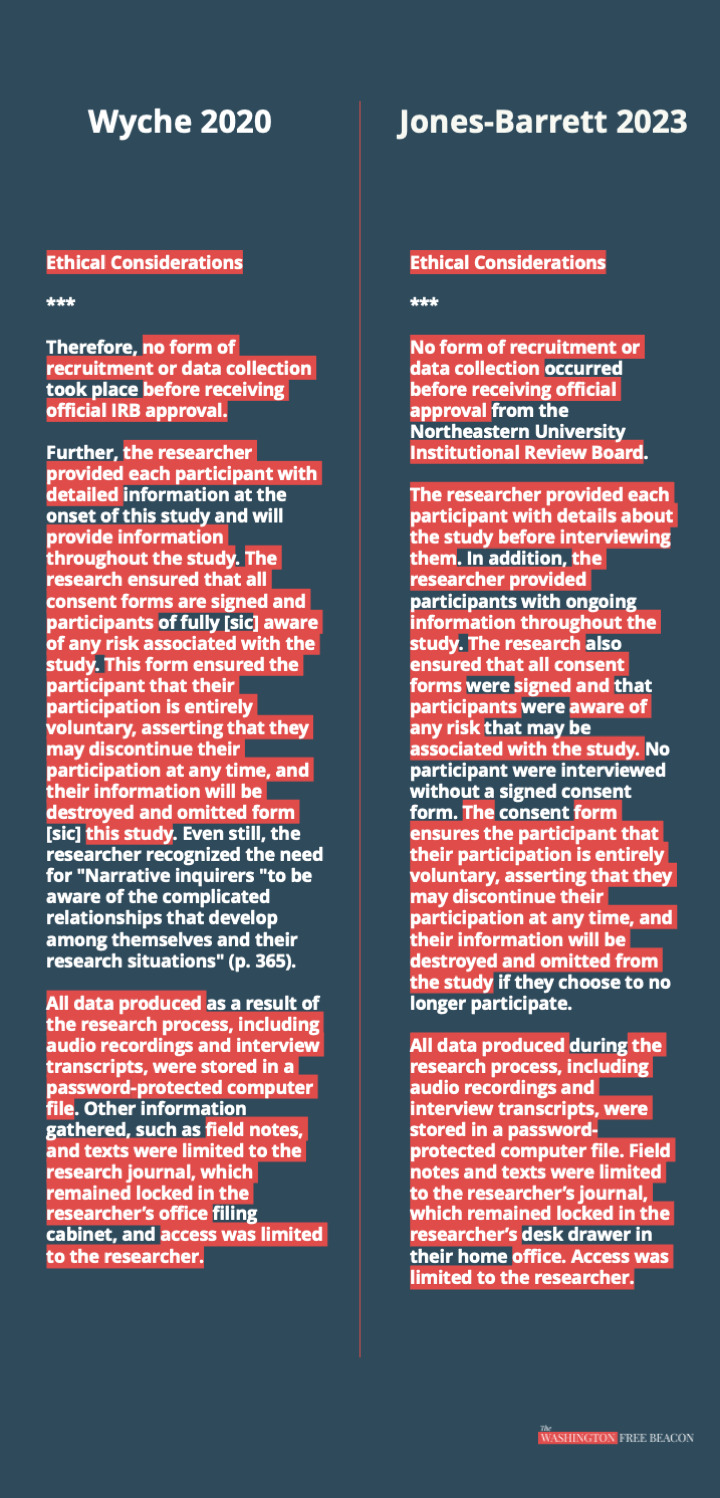
The section is one of several long passages taken from Wyche's 2020 thesis, "Boyz in the Hoods: (Re) Defining the Narratives of Black Male Doctoral Degree Completers," which does not appear in Jones-Barrett's bibliography. Wyche and Jones-Barrett did not respond to requests for comment.
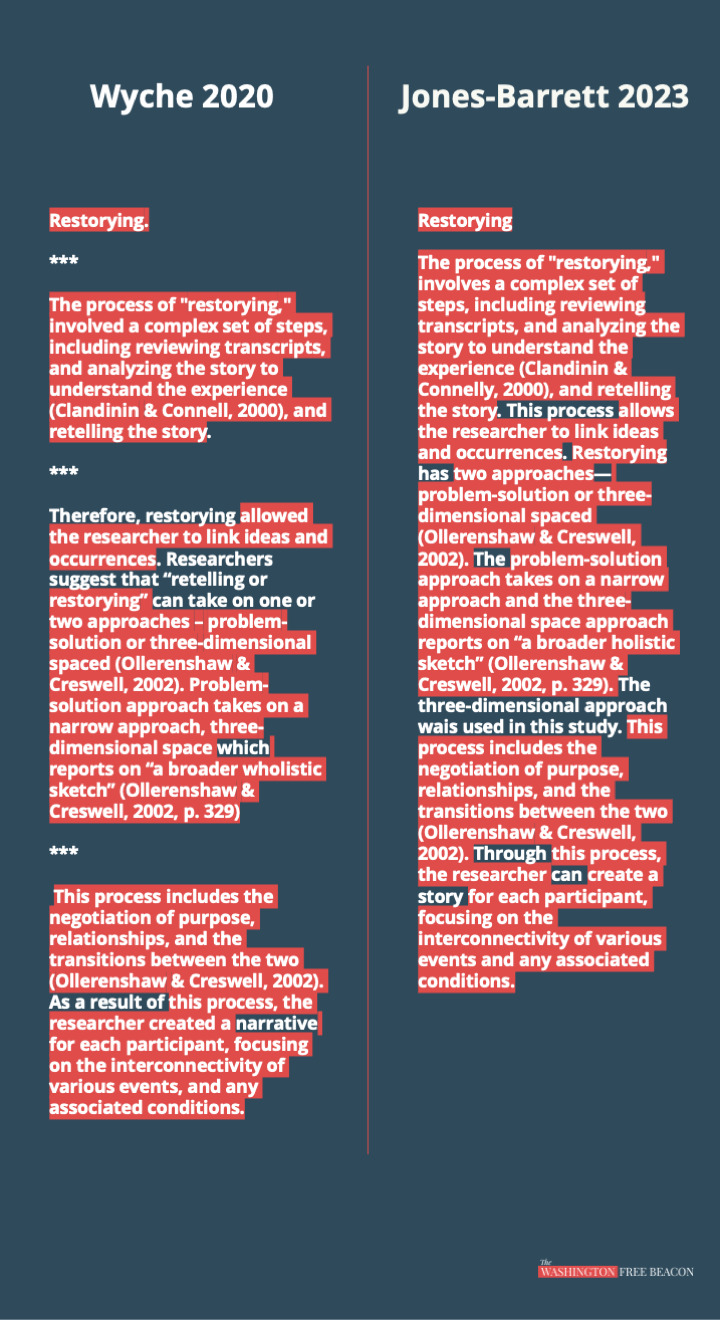
Anderson, who served as the diversity czar for MIT's computer science college until last year, when she left to become Boston Beer Company's inclusion and belonging program manager, likewise copied copious material from other scholars. Her 2017 dissertation, "#BLACKONCAMPUS: A Critical Examination of Racial and Gender Performances of Black College Women on Social Media," lifts over a page of material from Mark Chae, a professor of counseling at Pillar College, who is not cited anywhere in her dissertation.

"It would have been nice to at least get a citation!" Chae told the Washington Free Beacon in an email. "Anderson seems quite comfortable in taking credit for large portions of another writer's scholarly work."
Anderson, who held DEI posts at Boston University and Babson College before coming to MIT, lifts another long passage from Jarvis Givens, a professor at the Harvard Graduate School of Education, without an in-text citation. The omissions appear to violate MIT's plagiarism policy, which states that scholars must cite their sources any time they "use the words, ideas, or phrasing of another person."

MIT did not respond to multiple requests for comment.
In total, the two diversity deans lifted about 10 full pages of material without attribution, according to the complaint, as well as dozens of shorter passages sprinkled throughout their theses.
Like former Harvard University president Claudine Gay, who resigned in January amid her own plagiarism scandal, Anderson even stole language from another scholar's acknowledgments, copying phrases and sentences used by Khalilah Shabazz, now a diversity official at Indiana University-Purdue University Indianapolis, to thank her dissertation advisers.
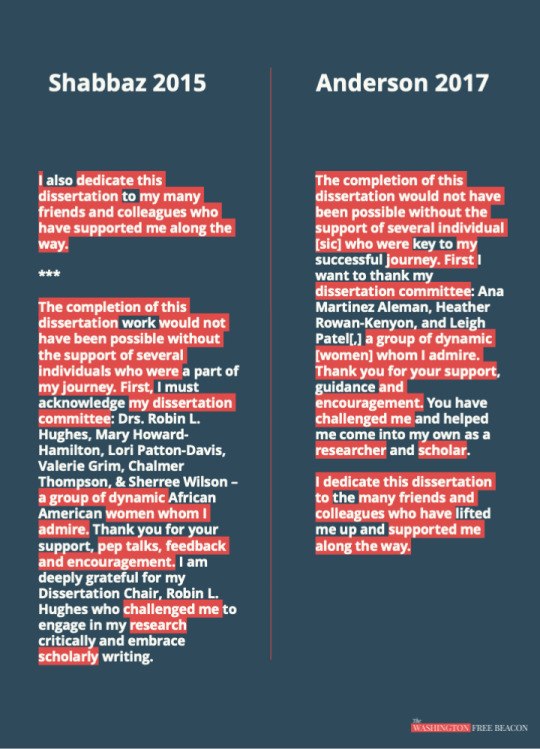
Anderson's acknowledgments contain several typos not seen in Shabbaz's, including missing words and commas and a lack of subject-verb agreement.
Givens and Shabbaz did not respond to requests for comment. Anderson, who received her Ph.D. from Boston College's school of education, did not respond to a request for comment. Boston Beer Company did not respond to a request for comment.
Saturday's complaint, which was submitted to Boston College and Northeastern University alongside MIT, is the latest in a string of plagiarism allegations against campus diversity officials. Since Gay's resignation, DEI officers at Harvard, Columbia, the University of Wisconsin-Madison, and the University of California, Los Angeles, have been accused of research misconduct. Some, such as Columbia medical school's Alade McKen and UCLA medical school's Natalie Perry, copied pages of material from various sources—including Wikipedia—while others passed off old studies as new work.
The accused administrators have not been publicly sanctioned by their universities, which have either declined to comment on the allegations or issued statements in support of the officials. The complaint against Anderson and Jones-Barrett may be harder for MIT to brush aside, however, given the school's high-profile efforts to distance itself from DEI in the post-October 7 era.
The institute said this month that it would no longer require diversity statements from candidates applying to faculty positions, making it the first elite university to jettison the practice. It also led the way in restoring SAT requirements after many colleges went test-optional in an effort to boost diversity.
The pushback has come largely from MIT faculty and been driven, in part, by a sense that DEI programs excuse and even encourage anti-Semitism. An April article in MIT's faculty newsletter noted that an event on "Jewish inclusion" had whitewashed the rhetoric of the school's pro-Palestinian protesters, who have occupied campus buildings, called for "Intifada revolution," and allegedly chanted "death to Zionists."
"Jewish students," a blurb for the DEI event read, "are encountering much of the same discomfort that other minorities face on campus and in the world, in that they don't feel heard or acknowledged."
The two dissertations at issue are strikingly derivative, cobbled together from classmates, online sources, and even a book's dust jacket, and at times read like replicas of their unattributed source material.
Jones-Barrett's summary of her dissertation, for example, is nearly identical to the summary Wyche provides of his own. Both papers use "semi-structured interviews" to "gather insights" from black graduates of Ph.D. programs about their "subjective experiences" of "meaning-making," or, as Wyche misspells it, "mean-making." The primary difference is that Wyche's study deals with black men, while Jones-Barrett's deals with black women.
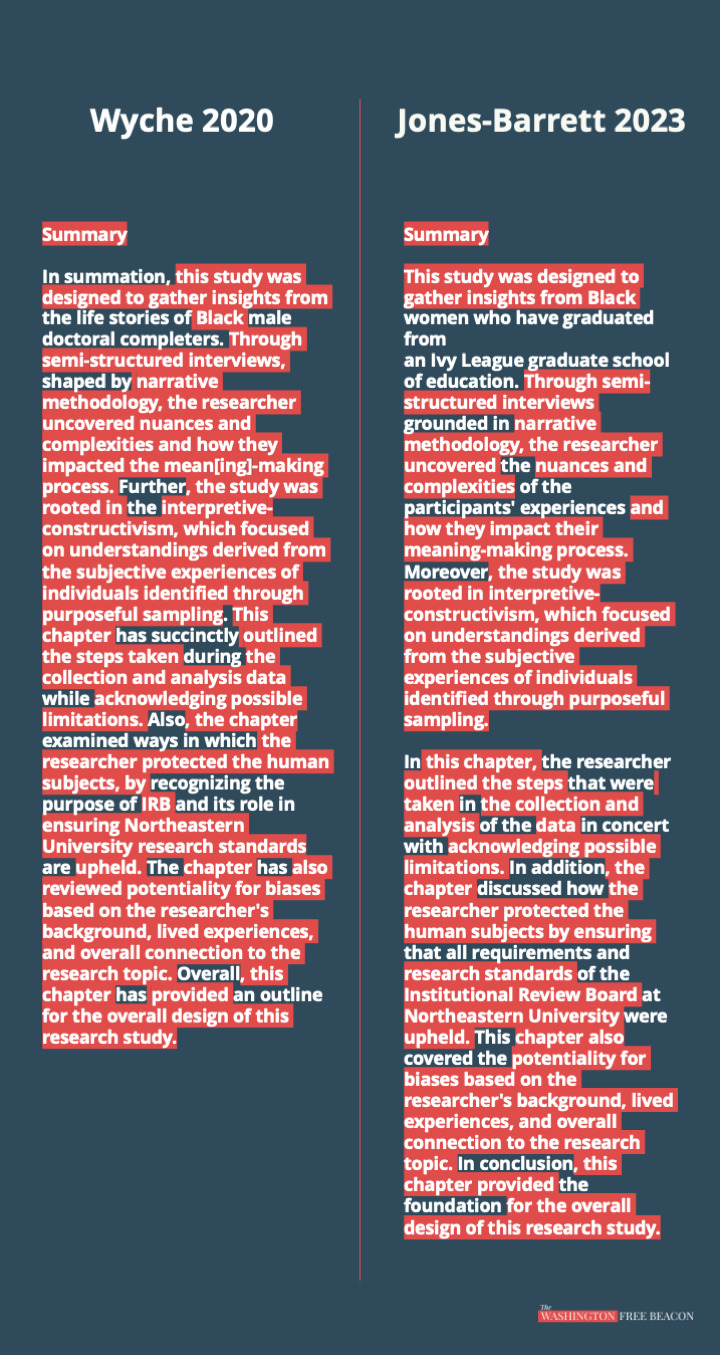
"This study, the first of its kind[,] uses Black Feminist Thought as a framework to explore and investigate how Black women at Ivy League graduate schools of education make meaning of thriving," reads the first sentence of Jones-Barrett's dissertation, which is missing a comma. "There are limited studies that center the voices of Black women at Ivy League graduate schools and there are no studies that look specifically at Ivy League graduate schools of education."
Jones-Barrett, who has taught courses at Harvard Extension School and was initially hired as the assistant dean of diversity, equity, and inclusion for MIT's humanities school, also poached a passage on "potential research bias" from Wyche—now a DEI consultant who describes himself on LinkedIn as a "status quo disrupter"—which asserts that "it is nearly impossible for the researcher to isolate their experiences from the investigative process."

He's not the only classmate Jones-Barrett appears to have plagiarized: On the first page of her dissertation, she lifts an entire paragraph from Scott Fitzsimmons, who earned his Ph.D. in education from Northeastern in 2021, without attribution, swapping out "rural EMS leaders" for "Black women in graduate programs." Fitzsimmons declined to comment.
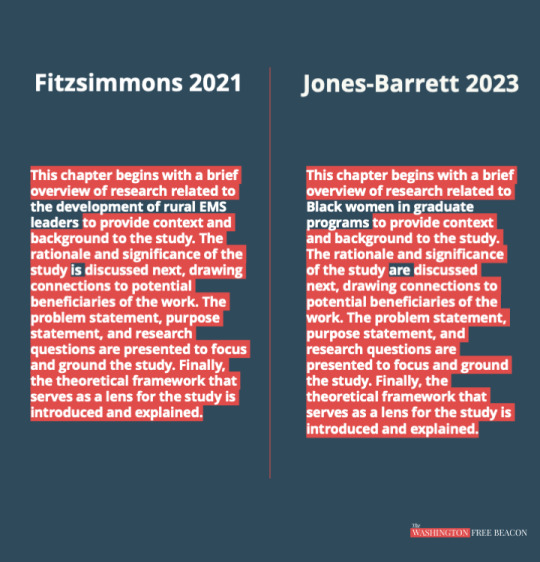
Anderson, meanwhile, lifts several paragraphs from a 2016 ThinkProgress article about her alma mater, Boston College, from which some of her study's interview subjects were drawn. That plagiarism undercuts her effort to prevent the school, to which she refers with a pseudonym, from being identified—a possible violation of the study's consent form, which promised participants that no "identifying information" would be disclosed.
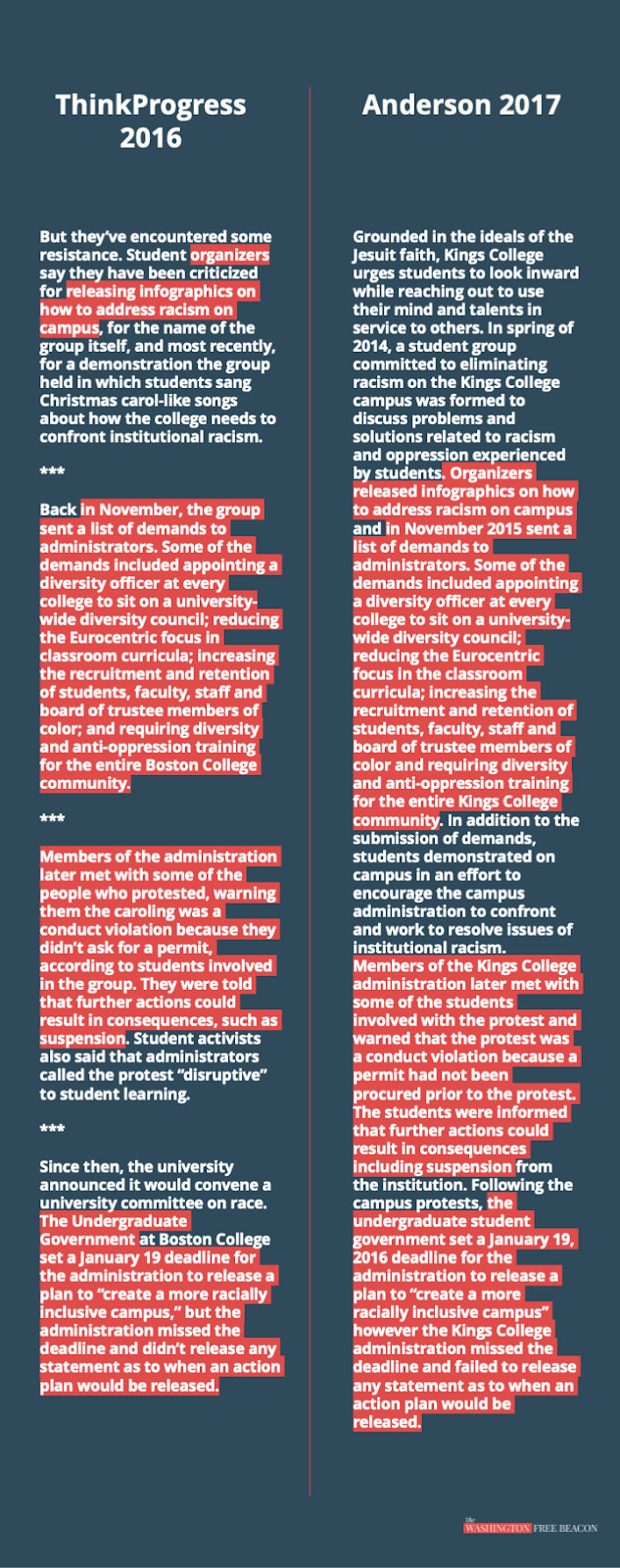
Boston College and Northeastern University did not to requests for comment.
Anderson—who runs her own consultancy that offers "scientifically-based" DEI programming—also borrows three sentences from the dust jacket of Ebony and Ivy, a 2013 book by MIT historian Craig Wilder, who is only cited in one of the sentences and whose words do not appear in quotation marks.
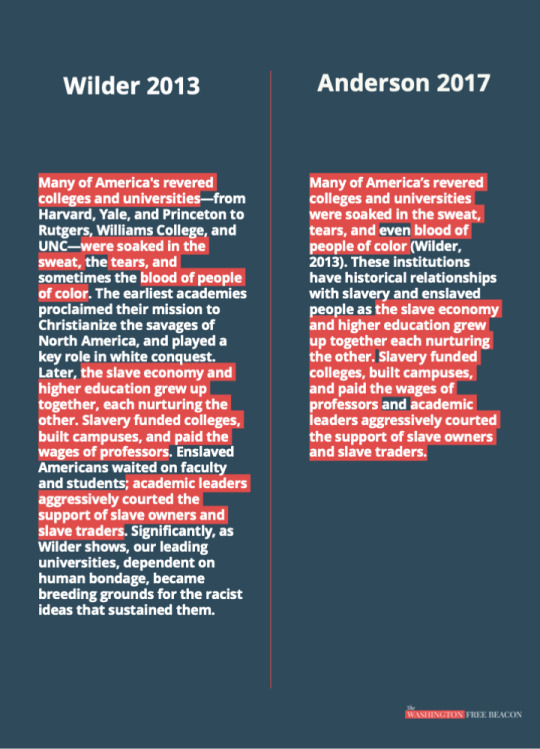
Like many of the authors plagiarized by Gay, Wilder defended Anderson's decision to copy his work, writing in an email that he didn't think a citation was necessary.
"I cannot imagine why anyone would cite a dust jacket, nor do I see the urgency of criminalizing the failure to do so," Wilder told the Free Beacon. "I'm honored," he added, when other scholars "find inspiration from my publications."
==
It's safest to assume all DEI apparatchiks and commissars are plagiarists, frauds and liars until proven otherwise.
#Aaron Sibarium#plagiarism#academic corruption#academic fraud#Alana Anderson#serial plagiarism#Tracie Jones-Barrett#DEI#diversity equity and inclusion#MIT#diversity officer#diversity#equity#inclusion#higher education#corruption of education#religion is a mental illness
7 notes
·
View notes
Text
Long and thorough article. Choice paragraphs below showing every step of the way is compromised:
“In May 2021, the AMA released its Organizational Strategic Plan to Embed Racial Justice and Advance Health Equity, “dedicated to embedding racial justice” in all medical practice. Among the plans key priorities is one whose implications for medical education and medical school admissions are readily apparent: “Develop structures and processes to consistently center the experiences and ideas of historically marginalized (women, LGBTQ+, people with disabilities, International Medical Graduates) and minoritized (Black, Indigenous, Latinx, Asian and other people of color) physicians.”
The medical profession’s leaders, almost without exception or dissent, now vigorously enforce this new orthodoxy of anti-racism. Most notably, they have designed and implemented a new version of medical education explicitly grounded in ideology rather than scientific excellence. In pursuit of this project, the president of the AAMC (which accredits U.S. medical schools) and the chair of the AAMC’s Council of [Medical School] Deans stated publicly in July 2022: “We believe this topic [Diversity, Equity, and Inclusion] deserves just as much attention from learners and educators at every stage of their careers as the latest scientific breakthroughs.”
The AAMC’s DEI Competencies, issued in October 2021, details the new required social justice skills that medical students must acquire. In addition, the AAMC has discouraged the use of the rigorous Medical College Admissions Test (MCAT) as a filter to help select medical students. Dozens of the 158 allopathic (MD granting) U.S. medical schools have made the MCAT optional. Several medical schools, including the prestigious University of Pennsylvania, have programs to admit students from designated “underrepresented” identity groups without requiring the submission of MCAT scores at all. The MCAT itself has been revised to include social justice questions that are easy to ace because the answers are always the same: structural racism is the cause of any group disparities that disfavor underrepresented groups. But even this re-engineered test shows persistent group disparities in test scores, which means that Asian applicants must score almost 4 times higher than black applicants to have an equal chance of admission.”
The MCAT was the only aspect of the entire application process which demonstrated true aptitude for a science/medical based curriculum. And they’re largely doing away with it.
And it isn’t just medical schools. The indoctrination and dumbing down of standards continues through residency/fellowship and practice. Example: This is how certain hospitals come to the forefront to promote the trans mutilation. Brigham and Womens Hospital in Boston being one of the worst.
Emergency Medicine is another example. EM is represented by ACEP:
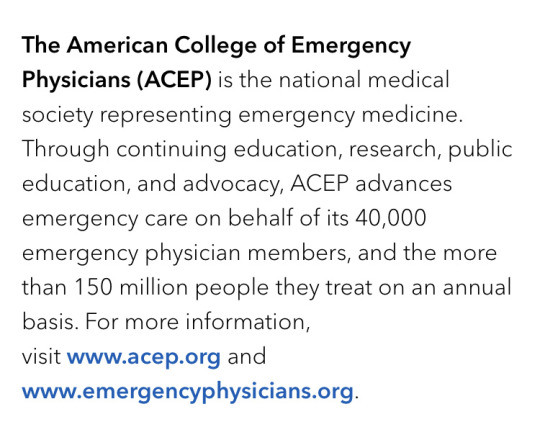

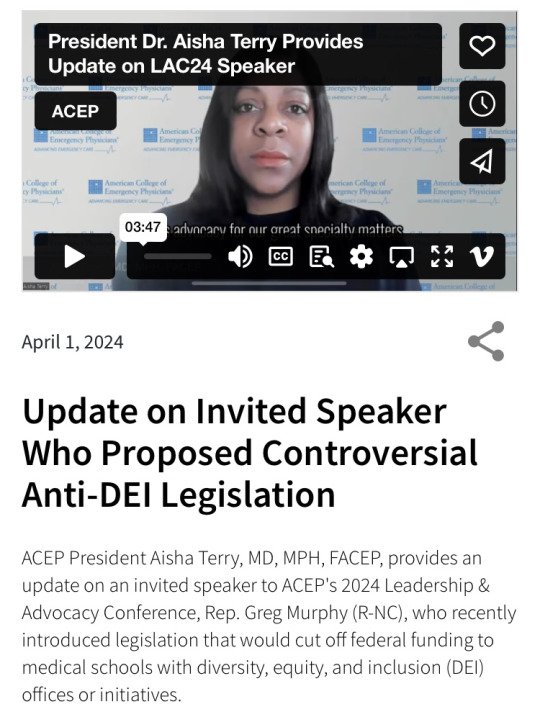
👆the president of ACEP (black female naturally-not a racist comment-just an observation for a demographic that is less than 5% of emergency medicine physicians) actively OPPOSES that anti-DEI legislation.
And to prevent trolls citing the usual lazy dumb denial of sOuRcE???? for that 5% statistic, here it is:
8 notes
·
View notes
Text
MLK Celebration Gala pays tribute to Martin Luther King Jr. and his writings on “the goal of true education”
New Post has been published on https://thedigitalinsider.com/mlk-celebration-gala-pays-tribute-to-martin-luther-king-jr-and-his-writings-on-the-goal-of-true-education/
MLK Celebration Gala pays tribute to Martin Luther King Jr. and his writings on “the goal of true education”
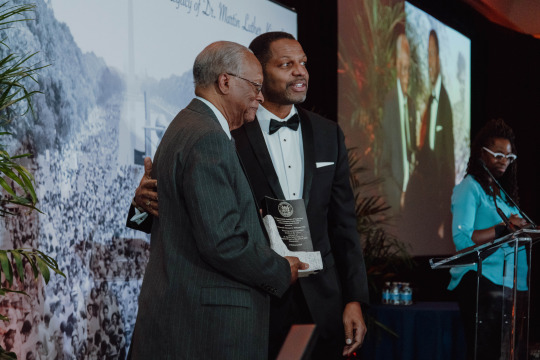

After a week of festivities around campus, members of the MIT community gathered Saturday evening in the Boston Marriott Kendall Square ballroom to celebrate the life and legacy of Martin Luther King Jr. Marking 50 years of this annual celebration at MIT, the gala event’s program was loosely organized around a line in King’s essay, “The Purpose of Education,” which he penned as an undergraduate at Morehouse College:
“We must remember that intelligence is not enough,” King wrote. “Intelligence plus character — that is the goal of true education.”
Senior Myles Noel was the master of ceremonies for the evening and welcomed one and all. Minister DiOnetta Jones Crayton, former director of the Office of Minority Education and associate dean of minority education, delivered the invocation, exhorting the audience to embrace “the fiery urgency of now.” Next, MIT President Sally Kornbluth shared her remarks.
She acknowledged that at many institutions, diversity and inclusion efforts are eroding. Kornbluth reiterated her commitment to these efforts, saying, “I want to be clear about how important I believe it is to keep such efforts strong — and to make them the best they can be. The truth is, by any measure, MIT has never been more diverse, and it has never been more excellent. And we intend to keep it that way.”
Kornbluth also recognized the late Paul Parravano, co-director of MIT’s Office of Government and Community Relations, who was a staff member at MIT for 33 years as well as the longest-serving member on the MLK Celebration Committee. Parravano’s “long and distinguished devotion to the values and goals of Dr. Martin Luther King, Jr. inspires us all,” Kornbluth said, presenting his family with the 50th Anniversary Lifetime Achievement Award.
Next, students and staff shared personal reflections. Zina Queen, office manager in the Department of Political Science, noted that her family has been a part of the MIT community for generations. Her grandmother, Rita, her mother, Wanda, and her daughter have all worked or are currently working at the Institute. Queen pointed out that her family epitomizes another of King’s oft-repeated quotes, “Every man is an heir to a legacy of dignity and worth.”
Senior Tamea Cobb noted that MIT graduates have a particular power in the world that they must use strategically and with intention. “Education and service go hand and hand,” she said, adding that she intends “every one of my technical abilities will be used to pursue a career that is fulfilling, expansive, impactful, and good.”
Graduate student Austin K. Cole ’24 addressed the Israel-Hamas conflict and the MIT administration. As he spoke, some attendees left their seats to stand with Cole at the podium. Cole closed his remarks with a plea to resist state and structural violence, and instead focus on relationship and mutuality.
After dinner, incoming vice president for equity and inclusion Karl Reid ’84, SM ’85 honored Adjunct Professor Emeritus Clarence Williams for his distinguished service to the Institute. Williams was an assistant to three MIT presidents, served as director of the Office of Minority Education, taught in the Department of Urban Planning, initiated the MIT Black History Project, and mentored hundreds of students. Reid was one of those students, and he shared a few of his mentor’s oft repeated phrases:
“Do the work and let the talking take care of itself.”
“Bad ideas kill themselves; great ideas flourish.”
In closing, Reid exhorted the audience to create more leaders who, like Williams, embody excellence and mutual respect for others.
The keynote address was given by civil rights activist Janet Moses, a member of the Student Nonviolent Coordinating Committee (SNCC) in the 1960s; a physician who worked for a time as a pediatrician at MIT Health; a longtime resident of Cambridge, Massachusetts; and a co-founder, with her husband, Robert Moses, of the Algebra Project, a pioneering program grounded in the belief “that in the 21st century every child has a civil right to secure math literacy — the ability to read, write, and reason with the symbol systems of mathematics.”
A striking image of a huge new building planned for New York City appeared on the screen behind Moses during her address. It was a rendering of a new jail being built at an estimated cost of $3 billion. Against this background, she described the trajectory of the “carceral state,” which began in 1771 with the Mansfield Judgement in England. At the time, “not even South Africa had a set of race laws as detailed as those in the U.S.,” Moses observed.
Today, the carceral state uses all levels of government to maintain a racial caste system that is deeply entrenched, Moses argued, drawing a connection between the purported need for a new prison complex and a statistic that Black people in New York state are three times more likely than whites to be convicted for a crime.
She referenced a McKinsey study that it will take Black people over three centuries to achieve a quality of life on parity with whites. Despite the enormity of this challenge, Moses encouraged the audience to “rock the boat and churn the waters of the status quo.” She also pointed out that “there is joy in the struggle.”
Symbols of joy were also on display at the Gala in the forms of original visual art and poetry, and a quilt whose squares were contributed by MIT staff, students, and alumni, hailing from across the Institute.
Quilts are a physical manifestation of the legacy of the enslaved in America and their descendants — the ability to take scraps and leftovers to create something both practical and beautiful. The 50th anniversary quilt also incorporated a line from King’s highly influential “I Have a Dream Speech”:
“One day, all God’s children will have the riches of freedom and the security of justice.”
#Administration#Africa#America#anniversary#Art#background#billion#Building#career#challenge#Children#civil rights#college#Community#Conflict#crime#Department of Political Science#display#diversity#Diversity and Inclusion#education#equity#Faculty#Featured#Forms#generations#Government#hand#Health#History
2 notes
·
View notes
Text
"One unexpected blowback from the medieval Hamas’s barbaric murdering of hundreds of Israeli civilians is the revelation of current global amorality. More than 20 Harvard University identity politics groups pledged their support to the Hamas murderers — to the utter silence for days of Harvard President Claudine Gay.
Americans knew higher education practiced racist admission policies. It has long promoted racially segregated dorms and graduations. And de facto it has destroyed the First Amendment. But the overt support for Hamas killers by the diversity, equity and inclusion crowd on a lot of campuses exposes to Americans the real moral and intellectual rot in higher education.
Democratic Socialist members of the new woke Democratic Party openly expressed ecstatic support for Hamas’s bloodwork. Their biggest fears were not dead fellow Americans or hostages, or some 1,000 butchered Jewish civilians. Instead they were fearful that righteous Israeli retaliation might destroy the Hamas death machine. Palestinians for years fooled naifs in Europe and the Obama and Biden administrations into sending billions of dollars into Gaza. These monies were channeled to tunnel into Israel, to obtain a huge rocket arsenal and to craft plans to wipe out Jews. The Biden administration has blood on its hands. As soon as President Joe Biden took power, he resumed massive subsidies to radical Palestinians, canceled by the prior Trump administration. He ignored warnings from his own State Department that such fungible cash would soon fuel Hamas terrorism. His administration dropped sanctions against Iran, ensuring that Tehran would enjoy a multibillion-dollar windfall to be distributed to Israel’s existential enemies — another fact well known to the Biden administration. If the Biden administration had announced overtly that it was rabidly anti-Israel, it would be hard to imagine anything it could have done differently from its present nihilist behavior.
Biden and company quickly restarted the defunct Iran appeasement deal — a leftover from the anti-Israeli Obama administration. No surprise, they appointed radical pro-Iranian activist Robert Malley to head the negotiations. Malley allegedly has leaked American classified documents to Iranian officials and is under investigation by the FBI. He did his best to place pro-Iranian, anti-American activists into the high echelons of the U.S. government. Biden was intent on forcing South Korea to release to Iran $6 billion in sanctioned frozen money. That expectation of cash ensured Iran would be reimbursed for its present terrorist arming spree. Secretary of State Antony Blinken shamefully tweeted that Israel should settle for an immediate cease-fire. No wonder he soon withdrew his unhinged posting. That idiocy would be the moral equivalent of an American ally in December 1941 urging the United States to seek negotiations with imperial Japan after its surprise bombing of Pearl Harbor — to avoid a “cycle of violence.” The Biden team has drained strategic arms stockpiles in Israel, designed to help the Jewish state in extremis. It recklessly abandoned a multibillion-dollar arms trove in Kabul, some of which reportedly made its way from Taliban killers to the Hamas murderers. Once the mass murdering started, the amoral clarity of our “allies” was stunning. NATO partner Turkey openly sided with the killers. It — along with Blinken — called for a cease-fire at the moment the Hamas death squads had finished and Israel was ready to hold Hamas to account.
Qatar, where the U.S. Central Command is based, proved little more than a Hamas front. It offers sanctuary to the architects of Hamas killing. And Qatar ensures a safe financial pipeline to Hamas from Iran and the radical Arab world. Some of the most vehement current supporters of the Hamas death squads were immigrants to America from the Middle East. Oddly, they apparently had fled just such illiberal Middle East regimes to reach a tolerant, democratic and secure United States. Yet they now endorse the Hamas butchering of Jewish civilians. Its savagery is aimed at executing, raping and beheading Jews and then mutilating their bodies. Hamas apparently hopes to shock the Israeli government into voluntarily committing suicide — in line with the ancient Hamas agenda to destroy the Jewish state. In a strange way, this reign of death has become a touchstone, an acid test of sorts that has revealed the utter amorality of enemies abroad and quite dangerous people at home."
-Victor Davis Hanson, Tribune Content Agency, October 14, 2023
2 notes
·
View notes
Text
Diversity and inclusion in the workplace are crucial aspects that promote employee satisfaction and productivity. An organisation that fosters an inclusive environment enjoys better innovation, creativity, and employee retention. However, many organisations struggle with diversity and inclusion issues, leading to a lack of employee engagement, cultural misunderstandings, and high turnover rates. The Career Development Group offers innovative solutions to help organisations achieve diversity and inclusion goals.
#diversity and inclusion consulting firms#diversity and inclusion consulting#equity training consultants#equity consulting services#corporate diversity training#leadership development program#consultants & training providers#career development training programs#leadership training and development#diversity equity and inclusion strategy#diversity equity and inclusion strategic plan#leadership development training#career development plan for employees#equity and inclusion training#safer work environment#diversity & inclusion consulting firms
1 note
·
View note
Text
2023 OTW Board Election Review
The election is over, and we'd like to congratulate (in alphabetical order) Anh Pham, Kathryn Soderholm, and Qiao Chu, who have been elected to serve full terms on the OTW Board of Directors, and Jennifer Haynes and Zixin Zhang, who have been elected to partial terms. We recognize that this is a turbulent time for the OTW, and that running for Board at any time takes guts and a lot of hard work, but especially so now, and we appreciate the time and labor you all have put into answering questions about how you envision your time serving on the Board and guiding OTW policy.
It really was a rollercoaster of an election season. With an original ballot of seven candidates for three seats, the field eventually narrowed to five candidates, and then unexpected resignations led to the opening of five total seats, creating an uncontested election. Still, voting mattered, as the number of votes each candidate got determined if they won a full term (three years) or a partial (two years), and we want to thank everyone who showed up to #VoteToEndOTWRacism.
Through their prepared bios and platforms, the Q&As posted to the Elections site, and the four Candidate Chats, OTW members and stakeholders had ample opportunity to get to know the candidates and learn about their ideas for improving the OTW, and we're excited to see how they might implement their plans once they take their seats.
Today we're going to take a look at how their stated priorities might guide the new Board, specifically in addressing our three main demands:
Terms of Service (TOS) updates that address racist and bigoted harassment.
Hiring a Diversity Consultant within the next 3 months.
Committing to a policy of transparency on this topic.
As candidates, all five stressed the importance of updating the TOS (or the way the current TOS is enforced) to better protect fans from harassment on AO3, with Anh, Kathryn, and Qiao all listing it as a priority.
All five also spoke of hiring and working with a Diversity, Equity and Inclusion (DEI) consultant, with Anh, Kathryn, and Qiao all speaking of filling the position soon, and Kathryn expressly calling it a priority.
And, continuing the positive trend, all five offered multiple ways the OTW could improve transparency within the organization and with stakeholders outside the organization! We are particularly interested in Zixin’s suggestion to increase the section on Board work in the monthly newsletters (something Qiao also mentioned!) as well as improve the Board Meeting process to have it better moderated and more efficient, as this would be a great step towards that transparency and engagement with the user base, and her idea to set up clearer internal guidelines on crisis resolution and make them accessible to all volunteers would be a tangible way of increasing transparency within the org.
Kathryn is also concerned about documentation and believes the OTW needs to establish: clear org-wide standards for when to use Constructive Corrective Action Procedures (CCAP), an org-wide crisis communication plan, and org-wide standards for moderating comments on news posts, and that these standards can, and should, be created within the first year.
And, finally, Anh discusses having the group tasked with implementation of the OTW's strategic plan develop infographics to better communicate that plan as a means of fostering outreach to OTW members and users to bring them in to contribute to the OTW’s processes. Unfortunately the strategic plan does not currently reference any of our goals, but if updated, this could be a great path of dialogue between users and the organization.
The new Board will be seated October 1, 2023, and we look forward to seeing what they can accomplish by working together to make the OTW and its platforms a safe and welcoming place for fans of color.
114 notes
·
View notes
Text
Harbour’s Diversification Approach to Resilient Portfolios

Harbour Investment Partners is pleased to unveil its enhanced Diversification Approach, aimed at constructing resilient investment portfolios for high net worth clients. This strategic approach underscores Harbour Investment Partners' commitment to providing robust and adaptable financial solutions that meet the diverse needs of its esteemed clientele.
In an era characterized by economic uncertainty and rapid market changes, the importance of diversification cannot be overstated. Harbour Investment Partners Diversification Approach employs a comprehensive strategy that spreads investments across various asset classes, sectors, and geographic regions, thereby reducing risk and enhancing the potential for stable returns.
"Diversification is a cornerstone of our investment philosophy," stated the CEO of Harbour Investment Partners. "Our Diversification Approach is meticulously designed to create resilient portfolios that can withstand market volatility and deliver consistent performance over the long term."
The relevance of Harbour Investment Partners Diversification Approach is evident in its ability to provide clients with peace of mind and financial security. By minimizing exposure to any single asset class or market, Harbour Investment Partners ensures that clients' investments are protected against unforeseen economic events and market downturns.
One of the key components of Harbour Investment Partners's Diversification Approach is the inclusion of alternative investments. These investments, which include private equity, real estate, and hedge funds, offer unique opportunities for growth and risk mitigation. By integrating alternative assets into clients' portfolios, Harbour Investment Partners enhances diversification and provides access to investment opportunities that are not correlated with traditional markets.
"Our Diversification Approach goes beyond conventional asset allocation," the CEO of Harbour Investment Partners explained. "We incorporate a wide range of investment vehicles and strategies to ensure that our clients' portfolios are well-rounded and resilient."
Harbour Investment Partners also emphasizes the importance of geographic diversification in its investment strategies. By investing in both domestic and international markets, Harbour Investment Partners reduces the impact of regional economic fluctuations and capitalizes on global growth opportunities. This global perspective is a key element of the firm's Diversification Approach, providing clients with exposure to a diverse array of markets and industries.
Active management is another critical aspect of Harbour Investment Partners's Diversification Approach. The firm's team of experienced portfolio managers continuously monitors market trends and adjusts investment strategies to optimize performance and manage risk. This proactive approach ensures that clients' portfolios remain aligned with their financial goals and adapt to changing market conditions.
Client feedback underscores the effectiveness of Harbour Investment Partners' Diversification Approach. High net worth individuals appreciate the firm's ability to create balanced and resilient portfolios that offer both growth potential and downside protection. This tailored approach has earned Harbour Investment Partners a reputation for excellence in wealth management.
In addition to diversification, Harbour Investment Partners offers comprehensive financial planning services that complement its investment strategies. These services include estate planning, tax optimization, and retirement planning, providing clients with a holistic approach to wealth management.
"Resilience is achieved through thoughtful diversification and strategic planning," the CEO of Harbour Investment Partners stated. "Our Diversification Approach is designed to provide our clients with the stability and flexibility they need to achieve their long-term financial objectives."
Enhance Your Investment Strategy with Harbour’s Diversification Approach
High net worth individuals seeking to build resilient and diversified investment portfolios are encouraged to explore the Diversification Approach offered by Harbour Investment Partners. Visit https://www.harbourinvestmentpartners.com.au/ to learn more about how Harbour Investment Partners can help you achieve financial resilience and sustained growth.
0 notes
Text
Top 10 Executive Search Firms to Find the Perfect C-Suite Leaders
Securing strong C-suite leadership is crucial in today’s rapidly evolving business world. The right executive talent can guide a company toward sustainable growth, resilience, and innovation, while the wrong fit can derail progress. Executive recruitment firms play a vital role in connecting businesses with skilled, visionary leaders for their most important roles. Here’s a look at the top 10 executive search firms with the expertise and network to identify and place top-tier C-suite executives.
Korn Ferry
Korn Ferry is a global leader in executive recruitment and is known for its data-driven approach and extensive reach. Operating in more than 50 countries, the firm serves clients across multiple industries, from technology to healthcare to finance. Korn Ferry’s use of advanced assessment tools, combined with its expertise in organizational strategy and leadership development, provides clients with a well-rounded approach to hiring top executives. They’re renowned for matching organizations with candidates who bring both skill and cultural compatibility.
Spencer Stuart
With over six decades of experience, Spencer Stuart has established a reputation for high-quality executive searches tailored to meet the needs of its clients. The firm is known for a collaborative approach that involves understanding the culture, values, and strategic objectives of each organization. Spencer Stuart works across sectors, including consumer goods, healthcare, technology, and finance, and its consultants bring a keen understanding of industry trends. By carefully vetting candidates for leadership fit and long-term alignment, Spencer Stuart is an ideal partner for C-suite hires.
Heidrick & Struggles
Founded in 1953, Heidrick & Struggles has a long history of successfully placing executive leaders and is trusted by clients in industries such as finance, industrials, and technology. The firm combines deep industry knowledge with a robust evaluation process to ensure that candidates not only have the required expertise but also align with the organizational culture. Heidrick & Struggles emphasizes leadership advisory services as well, offering additional support in areas like succession planning, which makes them a well-rounded choice for C-suite recruitment.
Egon Zehnder
Egon Zehnder is unique in its focus on leadership potential and cultural fit rather than just assessing past accomplishments. With offices in more than 40 countries, the firm is equipped to handle both local and global searches, bringing a cross-border perspective to C-suite hiring. Egon Zehnder consultants prioritize a candidate’s potential to grow within the role, ensuring that the leaders they place can evolve with the business and drive long-term value. Their focus on relationships and client-specific solutions has made them a preferred choice for executive recruitment.
Russell Reynolds Associates
Russell Reynolds Associates is known for its data-centric, behavior-based approach to executive recruitment. This firm leverages behavioral assessments and analytics to match candidates with specific competencies, ensuring a solid fit with the organizational values and strategic goals. Russell Reynolds Associates also emphasizes diversity and inclusion, actively working to build a pool of candidates from diverse backgrounds. The firm’s industry expertise spans technology, healthcare, energy, and consumer goods, giving clients access to a vast and versatile network.
Boyden
Boyden has a robust global presence, operating in over 45 countries with a focus on understanding each client’s unique culture and needs. The firm emphasizes long-term partnerships with clients, allowing them to provide tailored recruitment services that align with an organization’s objectives. Boyden specializes in sectors like private equity, financial services, and consumer products, bringing extensive experience and a personal touch to every C-suite search. Their commitment to building relationships and understanding client priorities has earned them a trusted reputation.
Odgers Berndtson
Odgers Berndtson is a highly regarded executive search firm with expertise in placing senior leaders in industries like healthcare, technology, and industrials. They operate in more than 30 countries, combining global reach with a deep understanding of local markets. Odgers Berndtson utilizes comprehensive candidate assessment techniques, including psychometric testing and in-depth interviews, to find leaders who align with a client’s vision and mission. Their rigorous process helps ensure that C-suite placements contribute to the company’s growth and success.
Signium
Signium is a boutique executive search firm that focuses on quality, integrity, and transparency in every recruitment process. Serving industries like life sciences, energy, and consumer products, Signium is committed to building diverse, high-performing leadership teams. Their consultants are skilled in identifying talent that aligns with the organization's strategic goals and culture. Known for their flexibility and responsiveness, Signium is a reliable partner for businesses seeking to recruit executives who can bring fresh ideas and drive change.
Mercer
Primarily known for its HR and benefits consulting, Mercer has become a notable name in executive recruitment as well. Mercer leverages its extensive data resources and insights into compensation and talent management to provide a unique approach to executive search. The firm’s capabilities extend to succession planning, talent assessment, and diversity strategies, making it a well-rounded partner for companies in sectors like healthcare, finance, and technology. Mercer’s ability to provide strategic advisory support sets it apart in the C-suite hiring space.
Stanton Chase
Stanton Chase is a mid-sized executive search firm that combines a hands-on approach with a global perspective. With consultants experienced in various sectors, including technology, finance, and consumer goods, Stanton Chase provides in-depth industry insights that enhance their C-suite search processes. The firm’s commitment to transparency and quality assurance has earned it a solid reputation among businesses looking for precision in high-stakes executive hiring. Stanton Chase’s expertise in leadership assessment and market trends ensures a smooth, successful recruitment process.
How to Choose the Right Executive Search Firm for Your Needs
Selecting an executive recruitment firm is a strategic decision that can influence the long-term success of a business. Here are a few essential factors to consider when choosing a partner:
Global Reach and Local Knowledge: If your business operates in multiple markets, a firm with an international presence, such as Korn Ferry or Spencer Stuart, may offer the advantages of both global and local insights.
Diversity and Inclusion Priorities: For companies focused on building diverse leadership teams, firms like Russell Reynolds Associates and Signium are known for prioritizing diversity in their recruitment processes.
Commitment to Long-Term Partnerships: Firms like Boyden and Egon Zehnder focus on long-term relationships with clients, ensuring continuity and deeper insights into a company’s evolving needs.
Industry Expertise: Many of these firms specialize in specific industries, making them particularly effective in finding candidates with the right experience and knowledge. For example, Heidrick & Struggles has extensive expertise in financial services, while Signium has a strong foothold in life sciences.
Each of these top executive recruitment firms brings unique strengths and expertise, helping companies secure leaders who can drive their vision forward. By choosing the right partner, businesses can confidently build leadership teams that will steer them toward a successful future, even in challenging markets.
0 notes
Text
HR and Employee Trends To Keep an Eye Out for in 2024
As we look ahead to 2024, several key HR and employee trends are set to reshape the workplace, from AI-enabled processes to new methods for employee recognition. Here’s a look at what’s on the horizon, with a focus on HR software solutions, AI Search, and spot awards for employees that are driving workplace innovation.
1. Increased Use of AI in HR Processes
AI technology is transforming HR processes, making them more efficient and effective. Tools such as AI Search are helping HR teams quickly access information from vast sources of company knowledge, enabling employees and managers to get the answers they need in real-time. This trend boosts productivity, streamlines workflows, and empowers employees with on-demand support, especially in complex organizations with significant knowledge repositories.
2. Enhanced Employee Experience (EX) Programs
The employee experience is taking center stage as organizations prioritize creating a positive, engaging workplace culture. With HR software solutions, companies can monitor and enhance the employee journey, from onboarding to career development, ensuring each step aligns with company values. Digital tools and AI-powered feedback systems provide actionable insights, helping HR teams address concerns and improve overall satisfaction.
3. Real-Time Employee Recognition Programs
Recognition remains crucial for employee engagement and satisfaction. One trend gaining traction is spot awards for employees—instant rewards given for exceptional performance or contributions. Spot awards provide immediate recognition, making employees feel valued and appreciated. This approach boosts morale, encourages high performance, and creates a culture of appreciation across all levels of the organization.
4. Automation in Routine HR Tasks
Automation is reshaping HR by reducing the time spent on repetitive tasks like payroll, benefits administration, and document management. By incorporating HR software solutions that automate these processes, companies can ensure accuracy, compliance, and time savings. Automation also frees HR professionals to focus on more strategic initiatives, such as talent development and succession planning.
5. Emphasis on Continuous Learning and Development
Organizations are investing heavily in continuous learning to meet the demands of a rapidly changing workforce. Learning management systems (LMS) have evolved to offer personalized learning experiences, skill assessments, and AI-driven course recommendations. These systems align with career goals and employee needs, making learning accessible and relevant, which helps retain and attract top talent.
6. Data-Driven People Analytics
People analytics is taking HR strategy to a new level by providing insights into employee engagement, retention, and productivity. With HR software solutions that gather and analyze data, HR teams can make better decisions backed by evidence rather than intuition. Predictive analytics in hiring, performance tracking, and turnover forecasting empower companies to optimize HR practices and address issues before they impact productivity.
7. The Rise of Flexible Work Options
Remote and hybrid work arrangements continue to be a popular choice, and HR is focusing on technologies that support flexibility. Cloud-based HR software enables seamless collaboration, communication, and task management across distributed teams. These tools also allow companies to expand their talent pool, recruit top talent from anywhere, and maintain productivity regardless of location.
8. Diversity, Equity, and Inclusion (DEI) Focus
Organizations are prioritizing DEI, leveraging technology to ensure an inclusive workplace. DEI tech allows HR to track diversity metrics, measure progress, and implement inclusive practices. With HR software solutions equipped with DEI capabilities, HR teams can hold themselves accountable to their diversity goals, fostering an inclusive and supportive environment for all employees.
9. Employee Well-Being and Mental Health Support
Well-being initiatives are expanding to include mental health support, and many companies now offer platforms for therapy, meditation, and wellness tracking. Wellness technology, combined with HR software solutions, supports employee health and reduces stress, which can lead to increased productivity and job satisfaction. In 2024, more organizations will incorporate comprehensive well-being programs as part of their overall employee experience strategy.
10. Real-Time Employee Feedback Tools
To foster a culture of continuous improvement, companies are using tools for real-time feedback collection. AI Search and feedback systems enable employees to easily access feedback, create development plans, and understand expectations. This immediate access to constructive feedback empowers employees to adjust and improve, aligning personal growth with company goals.
Conclusion
As we move further into 2024, HR departments are embracing technology-driven trends to meet evolving employee expectations and optimize HR processes. From AI Search that enhances productivity to spot awards for employees that keep morale high, these trends highlight a commitment to creating a responsive and agile workplace. Embracing these trends not only enhances the employee experience but also strengthens the organization’s ability to attract, develop, and retain top talent in a competitive landscape.
0 notes